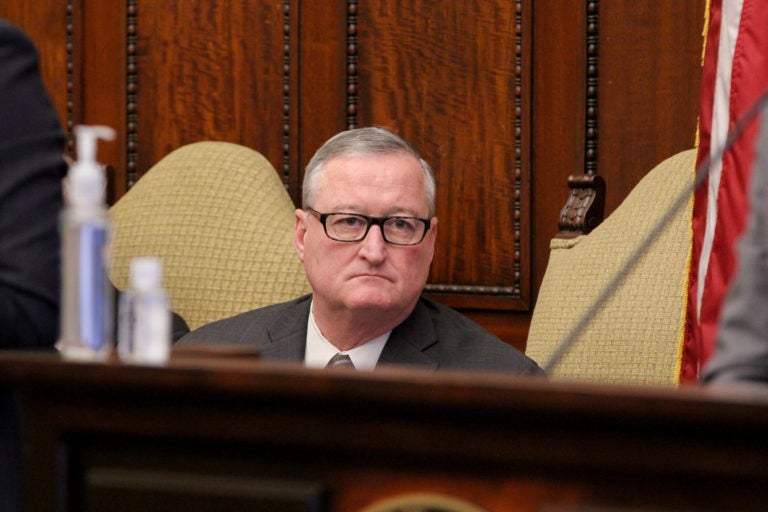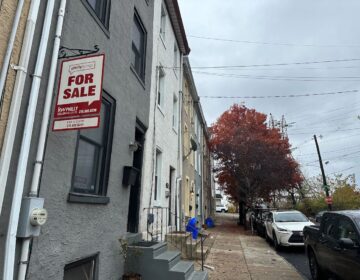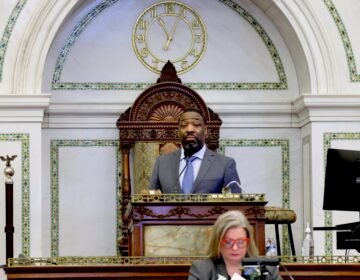Mayor Kenney’s first 2020 veto reversed in win for Society Hill Civic
Council overrode the veto despite objections from critics who said the regulations set the city back on efforts to create housing and reduce car use.

Philadelphia Mayor Jim Kenney listens during the daily coronavirus update at City Hall. (Emma Lee/WHYY)
Mayor Jim Kenney’s first direct veto of City Council legislation — over a bill establishing more restrictive zoning rules for the Society Hill neighborhood — has been reversed by the chamber.
Council overrode the veto despite objections from critics, including Kenney, who said the regulations set the city back on efforts to increase the supply of affordable housing and reduce the use of private cars in Center City.
First District Councilmember Mark Squilla, whose district includes the upscale neighborhood, introduced the legislation to cap the height of development along Walnut Street to just 65 feet, increase parking requirements and eliminate density bonuses granted in exchange for historic preservation. The bill would also limit building heights to 45 feet in some areas of the district spanning from Walnut to Lombard Street between 8th and the Delaware River.
While those provisions were approved unanimously early this month, Kenney later vetoed the legislation last week, describing it as a form of exclusionary zoning.
“Restricting overall development in Society Hill, the overlay will limit the supply of units necessary to meet housing demand,” Kenney wrote in a letter to Society Hill Civic Association, which has fought for the zoning changes.
But at a Thursday Council session, Squilla led a successful motion to reverse the Mayor’s veto — a provision the city’s charter allows with a two-thirds vote in favor — establishing the overlay as law following a thirteen to four vote.
“It doesn’t stop development, it requires a variance to build above whatever those restrictions are,” Squilla said of the overlay, ahead of the override vote. “That enables the community to have a voice.”
Councilmembers Kendra Brooks, Jamie Gauthier, Helen Gym and Isaiah Thomas all voted against the override in an unusual departure from the tradition of councilmanic prerogative that typically allows councilmembers control over land use questions in their districts. All four have made affordable housing a priority, advocating for policy reforms at a time when many neighborhoods are gentrifying with property values and rents rising out of reach for many people in what remains the nation’s poorest large city.
Brooks said she initially supported the bill because she values neighborhood input “in the decisions that impact their community.” But “after hearing from a larger swath of Philadelphians, I became concerned that the bill would favor certain privileged voices while stifling future affordable housing development throughout the city. If we are creating variances to support historic preservation we need to look at the city as a whole in our considerations and not favor wealthy areas,” she said in a statement following her vote.
Gauthier also said she initially supported the rezoning because of the “community engagement” involved but changed her mind after the veto gave her a chance to “vote in a way that reflects my beliefs around equity and inclusion.”
“It is true that density alone is not going to address affordability — but I still see this proposal as exclusionary, and for that reason I felt I could not support it,” Gauthier added.
Society Hill is among the wealthiest neighborhoods in the city and has previously attempted to impose similar zoning restrictions, which were effectively vetoed after Kenney refused to sign the legislation into law.
Like Old City, the neighborhood is home to numerous colonial era-buildings — but also many 20th century urban renewal-era structures, including the 309-foot I.M. Pei-designed Society Hill Towers. But proposals to construct a large hotel and residential towers near the diminutive Merchants’ Exchange Building, a national historic landmark, reignited residents’ interest in a more restrictive zoning overlay.
That push sparked a back-and-forth between the Society Hill Civic Association (SHCA) and groups that favor higher-density zoning as a means of reducing housing costs. Neighbors cast themselves as defending the historic character of the neighborhood, while critics said the legislation was designed to keep poorer residents out of a wealthy area and would make it more difficult to construct affordable housing.
During public comment, Ben She, from the self-described urbanist political action committee Fifth Square, spoke against the veto override. He noted that the overlay was at odds with the city’s own planning documents, which call for added density in wealthy areas to increase housing supply.
“We think this overlay is inherently exclusionary,” She said. “The city’s own Housing Action Plan states that strong market neighborhoods like Society Hill should accept even higher density or facilitate on-site affordable housing.”
SHCA President Larry Spector also spoke, stating that over 700 residents had signed a petition in favor of the veto override. He said the Preservation Alliance and the Independence National Historical Park had backed the bill, and that other areas already imposed height-limiting overlays.
He cast doubt on the notion that allowing more development would help truly alleviate housing costs, pointing to nearby luxury projects that ultimately built fewer units than they were approved for.
“If we really want to insist on affordable housing in all areas of the city, nothing short of mandating affordable units on site is going to do that,” he said.

Subscribe to PlanPhilly
WHYY is your source for fact-based, in-depth journalism and information. As a nonprofit organization, we rely on financial support from readers like you. Please give today.








